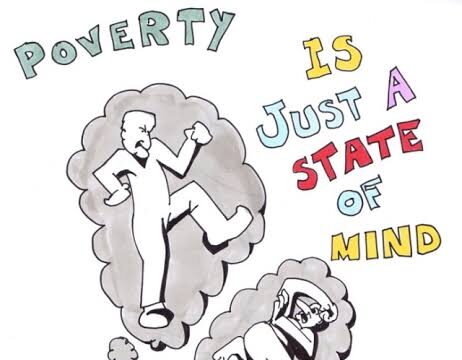Kingsley Enwelim Nwanze
In a world where material wealth is often equated with success, the concept of “poverty of the mind” emerges as a profound and insidious barrier to personal growth and self-esteem. This term encapsulates a mindset characterized by limiting beliefs, negative self-talk, and a pervasive sense of inadequacy. While financial poverty is a tangible struggle, poverty of the mind can be equally debilitating, affecting individuals from all walks of life.
At its core, poverty of the mind manifests through a lack of self-belief and an inability to envision a brighter future. Individuals trapped in this mental state often internalize societal messages that equate worth with achievement, leading to a cycle of self-doubt and despair. This internal dialogue can be relentless, with thoughts like “I am not good enough” or “I will never succeed” becoming the norm. Such beliefs not only hinder personal development but also erode self-esteem, creating a vicious cycle that is difficult to escape.
The effects of this mental poverty are far-reaching. Low self-esteem can lead to avoidance of challenges, reluctance to pursue opportunities, and a tendency to settle for less than one’s potential. In professional settings, individuals may shy away from promotions or new projects, fearing failure or rejection. In personal relationships, they may struggle to assert themselves, leading to unhealthy dynamics and further reinforcing their feelings of inadequacy.
READ MORE: Mozambique’s Election Crisis Sparks Clashes, SADC Plans Emergency Summit
Moreover, poverty of the mind can perpetuate a sense of isolation. When individuals feel unworthy, they may withdraw from social interactions, fearing judgment or ridicule. This isolation can exacerbate feelings of loneliness and despair, creating a feedback loop that deepens their mental poverty. The irony is that the very connections that could provide support and encouragement are often the ones they avoid.
Breaking free from this mindset requires intentional effort and self-compassion. It begins with recognizing and challenging negative thoughts, replacing them with affirmations of worth and capability. Seeking support from mentors, therapists, or supportive communities can also provide the necessary encouragement to foster a healthier self-image.
Ultimately, overcoming poverty of the mind is a journey toward self-empowerment. By cultivating a mindset of abundance and possibility, individuals can reclaim their self-esteem and unlock their true potential. In a society that often prioritizes material success, it is crucial to remember that true wealth lies in the richness of our thoughts and beliefs about ourselves. Embracing this truth can lead to transformative change, not just for individuals, but for communities as a whole.




